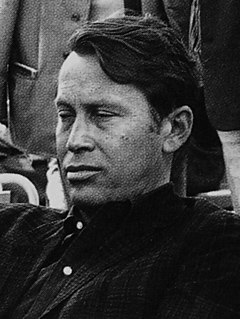A Quote by Ralph Waldo Emerson
A sturdy lad from New Hampshire or Vermont who in turn tries all the professions, who teams it, farms it, peddles, keeps a school,preaches, edits a newspaper, goes to Congress, buys a township, and so forth, in successive years, and always like a cat falls on his feet, is worth a hundred of these city dolls. He walks abreast with his days and feels no shame in not "studying a profession," for he does not postpone his life, but lives already.
Related Quotes
He that can toy with his ministry and count it to be like a trade, or like any other profession, was never called of God. But he that has a charge pressing on his heart, and a woe ringing in his ear, and preaches as though he heard the cried of hell behind him, and saw his God looking down on him-oh, how that man entreats the Lord that his hearers may not hear in vain!
Sometimes the warrior feels as if he were living two lives at once. 'There is a bridge that links what I do with what I would like to do,' he thinks. Slowly, his dreams take over his everyday life, and then he realises that he is ready for the thing he always wanted. Then all that is needed is a little daring, and his two lives become one.
The fact that labour is external to the worker, i.e., it does not belong to his intrinsic nature; that in his work, therefore he does not affirm himself but denies himself, does not feel content but unhappy, does not develop freely his physical and mental energy but mortifies his body and his mind. The worker therefore only feels himself outside his work, and in his work feels outside himself.
A library represents the mind of its collector, his fancies and foibles, his strength and weakness, his prejudices and preferences. Particularly is this the case if, to the character of a collector, he adds - or tries to add - the qualities of a student who wishes to know the books and the lives of the men who wrote them. The friendships of his life, the phases of his growth, the vagaries of his mind, all are represented.
Behold the Child among his new-born blisses
A six years' Darling of a pigmy size!
See, where 'mid work of his own hand he lies,
Fretted by sallies of his mother's kisses,
With light upon him from his father's eyes!
See, at his feet, some little plan or chart,
Some fragment from his dream of human life,
Shaped by himself with newly-learned art.









































